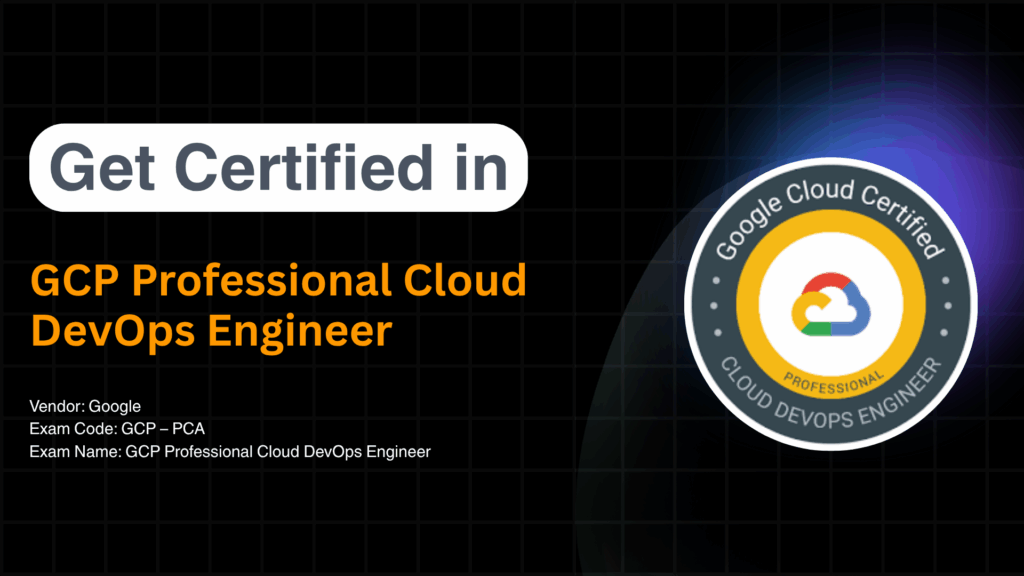GCP Professional Cloud DevOps Engineer

The Google Cloud Professional Cloud DevOps Engineer certification validates your expertise in combining software development and operations using Google Cloud tools, SRE principles, CI/CD automation, and scalable infrastructure management. This certification is ideal for professionals aiming to enhance deployment reliability, reduce operational overhead, and accelerate development cycles in cloud-native environments. Working DevOps engineers, cloud engineers, and SRE practitioners greatly benefit from this credential, as it demonstrates a high level of proficiency in monitoring, automation, service reliability, and production optimization on GCP.
At Certify360.ai, we make your GCP DevOps exam preparation seamless with AI-personalized learning paths, hands-on labs, and scenario-based mock tests crafted specifically for the exam. Our platform analyzes your strengths and weaknesses, recommends targeted topics, and gives you practice with real-world GCP environments. With adaptive quizzes, performance analytics, and expert-curated content, Certify360 ensures you gain the practical skills and confidence required to pass the Professional Cloud DevOps Engineer exam on your first attempt.
Exam Overview
- Number of Questions: 100 questions (multiple choice or multiple response)
- Exam Duration: 120 minutes
- Exam Fee: 200 USD (may vary slightly based on region and currency exchange rates)
- Delivery Options: Online proctored exam, In-person at a Pearson VUE testing center
Why Choose US?
Certification study guides for GCP Professional Cloud DevOps Engineer
- Architecting Solutions: Design automated, scalable, and resilient CI/CD pipelines on GCP to support rapid software delivery and reliable application operations.
- Using Core Cloud Services: Get hands-on with Cloud Build, Cloud Run, Artifact Registry, Cloud Logging, Cloud Monitoring, GKE, and Cloud Deploy to build end-to-end DevOps workflows.
- Data Security: Implement IAM, service accounts, secrets management, VPC Service Controls, and encryption to secure pipelines, workloads, and operational processes.
- Designing High Availability: Build reliable services using SRE best practices, GKE auto-scaling, load balancing, error budgets, and multi-region deployment strategies.
- Cost Optimization: Reduce operational costs using autoscaling policies, resource rightsizing, cost monitoring tools, and efficient CI/CD execution strategies.
- Monitoring and Troubleshooting: Use Cloud Logging, Cloud Monitoring, Error Reporting, and Cloud Trace to troubleshoot issues, analyze performance, and ensure service reliability.
Best resources for GCP Professional Cloud DevOps Engineer
- Review the official GCP Study Guide and take online practice exams.
- Set up a free-tier GCP account to practice, explore hands-on labs, and join GCP communities to stay updated on best practices.
- Here are some curated resources to support your study journey:AWS Whitepapers
How to pass GCP Professional Cloud DevOps Engineer
- Understand the Exam Blueprint
Review the official GCP exam guide to understand the domains, weightage, and types of questions.
- Hands-On Practice
Use the GCP Free Tier to get real-world experience with services like EC2, S3, IAM, VPC, and RDS.
- Take Practice Exams
Regularly test yourself with mock exams to identify weak areas and get comfortable with the exam format.
- Review Whitepapers & FAQs
Focus on GCP whitepapers like the well-architected framework, and read FAQs for core services.
Tips to pass GCP Professional Cloud DevOps Engineer
a. Understand the Exam Domains
Focus on:
SRE principles and service reliability
CI/CD pipeline automation
Monitoring, logging, and observability
Kubernetes/GKE operations
Incident response and production troubleshooting
b. Use Official Google Cloud Resources
GCP Exam Prep Guide
GCP Documentation (Monitoring, Cloud Build, GKE, IAM)
Google Cloud Skill Boost Labs
SRE Workbook and Google Production Guides
c. Practice with Real-World Scenarios
Work with actual CI/CD pipelines, optimize performance, manage GKE deployments, and analyze logs and traces to mimic real DevOps workflows.
d. Take Mock Tests on Certify360
Use scenario-based assessments, troubleshooting labs, and adaptive practice exams to evaluate readiness and improve time management.
How Learners Benefited from Certify360 in Achieving Certification ?



If you know someone studying for this cert, share this with them
